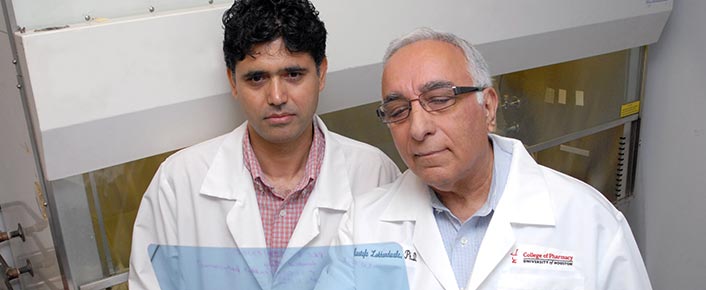Research News
Homing in on Hypertension
Lokhandwala, Banday Earn $1.3M NIH Grant to Study Protein's Activation of Antioxidants to Maintain Normal Blood Pressure
Two UH College of Pharmacy researchers are investigating how activation of endogenous antioxidant pathways can protect the natriuretic hormonal system in kidneys to maintain sodium homeostasis and normal blood pressure.
The disruption of renal natriuretic receptors could cause sodium imbalance and development of hypertension, which affects more than 70 million Americans and is a major risk factor for stroke, heart failure and other renal and cardiovascular diseases.
Professor Mustafa F. Lokhandwala, Ph.D., and Research Assistant Professor Anees A. Banday, Ph.D., are examining the role of a specific protein in activating anti-oxidant genes to protect renal/kidney dopamine receptors from oxidative damage and in turn allow renal hormone dopamine to maintain sodium homeostasis. The protein, called redox-sensitive transcription factor NRf2, controls the flow of genetic information from DNA to mRNA by binding to specific DNA sequences.
Supported by a four-year, $1.3 million National Institute of Diabetes and Digestive and Kidney Diseases (NIDDK) grant awarded in September, the outcome of their research could offer novel insight into the mechanism as it relates to an antioxidant-based therapeutic approach to such chronic diseases as hypertension.
Kidneys play a pivotal role in regulating blood volume, sodium balance, pH and blood pressure, and dopamine via activation of renal dopamine receptors is an important factor that works to control sodium balance and subsequently maintains normal blood pressure, Lokhandwala said.
"Any dysfunction in the renal dopamine mechanism would lead to excessive sodium reabsorption, volume expansion and ultimately hypertension," Lokhandwala said. "There are various factors that play a role in causing an increase in blood pressure, one of which is oxidative stress. When you increase levels of reactive oxygen species – or free radicals – in the body, and specifically in the kidney, they cause damage to the functioning of hormonal systems in such a way that you are predisposed to development of hypertension and other disorders."
Oxidative stress causes a dysfunction of renal dopamine receptor function, such that during elevated levels of reactive oxidative species, dopamine is not able to promote sodium excretion because its receptor function – or the place where dopamine acts to produce sodium re-absorption – the area (receptor) is not functioning properly. This leads to sodium retention and hypertension.
"What we’ve discovered is when you elevate levels of reactive oxidative species, there are various changes that take place when this happens," Lokhandwala said. "There are various endogenous factors that come in to fight the reactive oxidative species, including the endogenous anti-oxidant enzymes that get activated to reduce the oxidative stress. There are certain transcription factors that lead to the formation of these anti-oxidant enzymes in the body, including the kidney."
With normalization of receptor function, blood pressure is lowered because the receptor for the hormone that’s not functional because of oxidative stress becomes functional. There are certain compounds that activate anti-oxidant enzymes, which reduce oxidative stress and restore dopamine receptor function. The investigators are conducting experiments using one such compound called resveratrol, a constituent of red wine.
"We’ve found that in transgenic mice resveratrol can lower oxidative stress by activating the transcription factor NRf2, restore renal dopamine receptor function and decrease blood pressure," Lokhandwala said.
The results of their research could have significant implications not only in the understanding and treatment of hypertension, but countless other disease states in which oxidative stress is believed to have a role.
"Oxidative stress is present in many disease states, so you can take these compounds to be beneficial for other disease states, such as neurological disorders, cancer and diabetes," Banday said. "Fruits and vegetables are natural sources of anti-oxidant compounds and can be taken over a long time without negative effects, which is always something that has to be taken into account with drugs. Most drugs right now address the symptoms, but we’re trying to find the mechanism. In cardiovascular medicine, if you fix one thing, it has profound benefits on other things."
Results of their studies leading up to the current project recently have been published in the journals Hypertension and the American Journal of Physiology: Renal Physiology.
